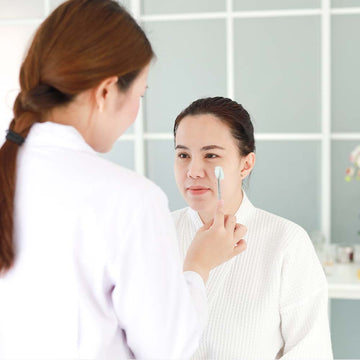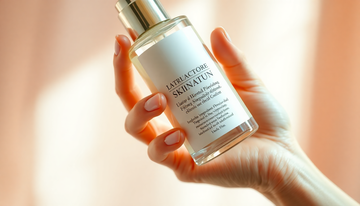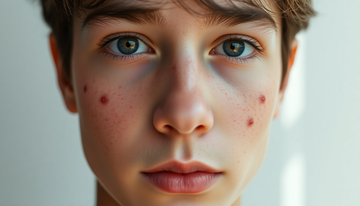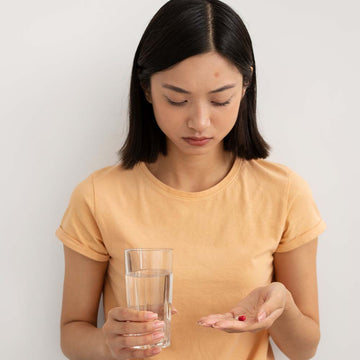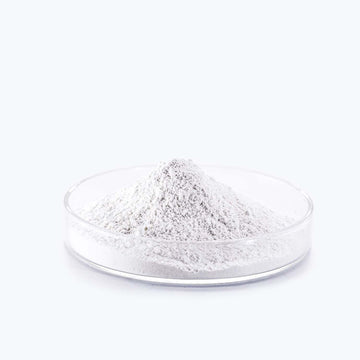What is Acne?
Acne, specifically known as Acne vulgaris, is one of the most prevalent dermatological conditions globally. It affects more than 85% of adolescents and approximately two-thirds of adults aged 18 and older, according to the National Center for Biotechnology Information (NCBI). Despite its prevalence among teenagers, acne isn't limited to this age group and can persist into adulthood, affecting individuals irrespective of age.
Definition and Prevalence
Acne vulgaris occurs due to the blockage of hair follicles by oil (sebum) and dead skin cells, leading to the formation of whiteheads, blackheads, or pimples. While it is commonly associated with the teenage years, acne can be a persistent condition that continues into adulthood. It manifests in various forms, ranging from mild to severe, affecting different parts of the body.
Signs and Symptoms
Severity of Acne
Acne presents itself in various forms, and its severity can vary widely among individuals. The most common signs include closed plugged pores known as whiteheads, open plugged pores called blackheads, red tender bumps termed papules, pustules (commonly known as pimples), nodules characterized by solid and painful lumps beneath the skin, and cystic lesions - large lumps filled with pus.
Types of Acne

Acne causes several types of lesions, or pimples. Doctors refer to enlarged or plugged hair follicles as comedones. Types of acne include:
1.Blackheads: Plugged follicles that reach the surface of the skin and open up. They look black on the skin surface because the air discolors the sebum, not because they are dirty.
2.Whiteheads: Plugged hair follicles that stay beneath the skin and produce a white bump.
3.Papules: Inflamed lesions that usually appear as small, pink bumps on the skin and can be tender to the touch.
4.Cystic acne: They are large, red, painful breakouts deep in your skin.
5.Nodules: Large, painful solid lesions that are lodged deep within the skin.
6.Pustules or pimples: Papules topped by white or yellow pus-filled lesions that may be red at the base.
Contributing Factors
Causes of Acne
2.Clogged Pores: When dead skin cells and oil block hair follicles, it creates an environment for bacteria to thrive, leading to inflammation and acne.
3.Bacteria: Propionibacterium acnes, a type of bacteria, can aggravate acne by causing inflammation in clogged pores.
4.Hormonal Changes: Hormonal fluctuations during puberty, menstrual cycles, pregnancy, or hormonal disorders can increase oil production, triggering acne.
5.Inflammation: Inflammatory responses in the skin due to factors like bacteria or irritation can exacerbate acne.
6.Genetics: A family history of acne can increase the likelihood of experiencing it.
7.Certain Medications or Products: Some medications or skincare products can cause acne as a side effect or due to pore-clogging ingredients.
8.Diet: While not fully proven, certain dietary factors like high glycemic index foods or dairy products might contribute to acne in some individuals. (High Glycemic Index Foods (Refined carbohydrates like white bread, sugary snacks) Dairy Products (Especially skim milk), Fatty Foods,Chocolate,Processed fast foods and Sugary foods.
Managing Acne
Treatment Options
Certainly! Here are various treatment methods for acne:
Remember, treatment effectiveness varies based on individual skin types and the severity of acne.
Certainly! Here are various treatment methods for acne:
1.Topical Treatments: Over-the-counter or prescription creams, gels, or lotions containing ingredients like benzoyl peroxide, salicylic acid, retinoids, or antibiotics that target acne-causing bacteria and unclog pores.
When exploring treatments for acne, it's crucial to understand the role of active ingredients. Some treatments, like those involving Salicylic Acid, focus on gently exfoliating the skin and unclogging pores. Others, such as those featuring Micronized Benzoyl Peroxide, work to eliminate acne-causing bacteria.
2.Oral Medications: Antibiotics, combined oral contraceptives (for females), or oral retinoids prescribed by dermatologists for moderate to severe acne.
3.Lifestyle Adjustments: Keeping the skin clean, avoiding excessive makeup, using non-comedogenic products, and adopting a gentle skincare routine.
4.Professional Procedures: Dermatological procedures like chemical peels, laser therapy, or extraction performed by specialists for severe acne or scarring.
5.Natural Remedies: Some explore natural treatments like tea tree oil, azelaic acid, or applying certain herbal extracts that may have antimicrobial or anti-inflammatory properties.
6.Home Remedies: Home-based treatments like applying ice, using honey or aloe vera, or following DIY masks, although their effectiveness varies.
7.Dietary Changes: Some individuals find that certain dietary modifications, like reducing dairy or high-glycemic foods, might help improve acne symptoms.
Conclusion: Dealing with Acne
Importance of Early Treatment
Early initiation of treatment plays a crucial role in managing acne. Prompt treatment not only helps in reducing the physical symptoms but also aids in minimizing emotional distress and the risk of scarring. Understanding the underlying causes of acne empowers individuals to take proactive steps in managing their skin health. It paves the way for clearer, healthier skin, boosting confidence and overall well-being.
This comprehensive overview aims to provide valuable insights into acne, its diverse manifestations, potential causes, and a range of effective treatments. Understanding these aspects is fundamental to better management and improved outcomes for individuals dealing with acne-related concerns.To know more click here.
FAQ'S
1.What distinguishes different types of acne lesions?
Acne lesions include various types such as blackheads, whiteheads, papules, cystic acne, nodules, and pustules. They differ based on their appearance, causes, and depth within the skin.
2.How can hormonal changes affect acne development?
Hormonal fluctuations during puberty, menstrual cycles, pregnancy, or certain hormonal disorders can increase oil production, leading to acne development. These changes impact the skin's sebaceous glands.
3.Are dietary factors linked to acne development?
While not conclusively proven, certain dietary elements like high glycemic index foods or dairy products might contribute to acne in some individuals. This association remains under study within the scientific community.
4.What are the primary treatment options for managing acne?
Treatment options vary and include topical treatments (creams, gels, lotions), oral medications, lifestyle adjustments, professional procedures, natural remedies, home remedies, and dietary changes.
5.Why is early acne treatment crucial?
Early initiation of acne treatment is essential as it helps reduce physical symptoms, minimizes emotional distress, lowers the risk of scarring, and enhances overall skin health and well-being.
